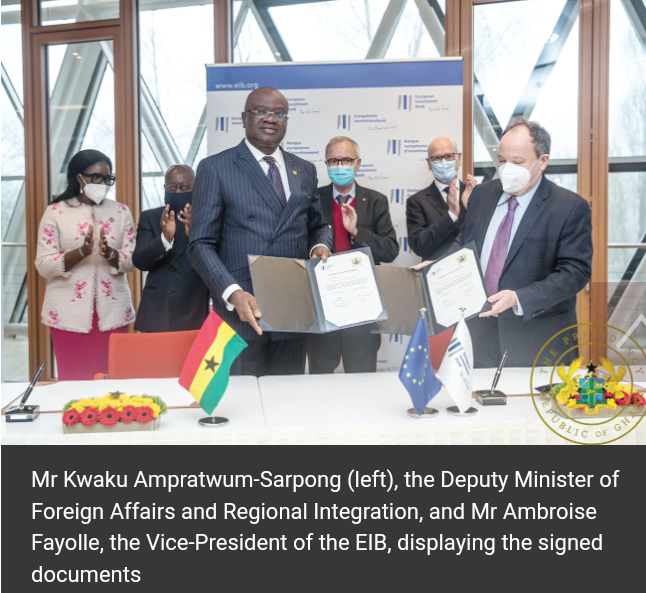The European Investment Bank (EIB) has provided Ghana with an €82.5-million concessional loan to strengthen health care, provide specialist medical equipment and medicines across Ghana under the National COVID-19 Health Response Plan.
Under the concessional package, the funding comprises €75 million from the EIB and a €7.5 million grant from the European Union (EU) Commission.
An agreement to that effect was signed at the EIB Headquarters in Luxembourg during President Nana Addo Dankwa Akufo-Addo’s one-day official visit to the landlocked Western European country.
The Deputy Minister of Foreign Affairs and Regional Integration, Mr Kwaku Ampratwum-Sarpong, signed for Ghana, while the Vice-President of the EIB, Mr Ambroise Fayolle, initialled for the bank.
The new agreement with Ghana represents the largest national EIB financing for COVID-19-related health investment in sub-Saharan Africa.
President Akufo-Addo said a strengthened cooperation between Africa and multilateral development partners was crucial to share global best practices and ensure a rapid response to health, social and health challenges triggered by the COVID-19 pandemic.
He noted that the EIB and the EU were key partners for Ghana and, therefore, welcomed their support for the National COVID-19 Health Response Plan.
Ghanaian and EIB experts have worked tirelessly in recent months to finalise this initiative since President Werner Hoyer and I met earlier this year. Specialist healthcare and medical services will benefit from both the EIB’s largest backing for COVID-19 health resilience in Africa and the EU grant support,” he added.
Visionary step
The President of the EIB, Mr Hoyer, noted that Ghana had taken visionary steps to ensure that the impact of COVID-19 could be managed and long-term investment unlocked to strengthen both health services and access to finance by business.
“A few months ago, President Akufo-Addo and I confirmed EIB backing for the Development Bank of Ghana (DBG).
“It is an honour to welcome our Ghanaian friends to our Luxembourg headquarters to demonstrate the impact of our joint response to improve COVID-19 health care and discuss how to further strengthen Team Europe’s partnership to improve lives and opportunities in Ghana in the years ahead,” Mr Hoyer added.
For her part, the EU Commissioner for International Partnerships, Ms Jutta Urpilainen, said Europe and Ghana stood side by side to tackle the health challenges triggered by the COVID-19 pandemic.
She explained that the new Team Europe support for Ghana’s COVID-19 Health Response Plan would strengthen public health and enhance resilience to the pandemic across Ghana in the months and years ahead through new investments backed by the EU and the EIB.
Context
The meeting provided an opportunity to discuss recent EIB support for the retrofitting of the Kpong Dam, the DBG and COVAX, explore future cooperation to support local vaccine manufacturing and outline the EIB’s strengthened engagement in Africa through a new dedicated development finance branch to be launched in the new year.
The EIB and the EU-backed health investment will improve medical treatment for patients with COVID-19 at treatment and isolation centres and intensive care units, as well as measures to detect and contain the virus and slow transmission.
The initiative will enhance both medical treatment during the pandemic and public health in the years ahead.
Ghana was the first country in Africa to receive COVID-19 vaccines under the EIB/EU-backed COVAX initiative.
EIB experts also briefed President Akufo-Addo on plans to further accelerate the delivery of vaccines across sub-Saharan Africa.
New support
The EIB is finalising new support for business investment in Ghana expected to be confirmed in the coming weeks.
This follows the formal agreement in May this year between President Akufo-Addo and EIB President Hoyer for €170 million EIB backing for the new DBG.
That represented the largest ever EIB engagement in Ghana and most significant support for a national development finance institution in Africa.
Once operational,the DBG will increase access to long-term finance and boost job creation for thousands of businesses in key sectors, including agribusiness, manufacturing, information and communications technology (ICT), tourism and other services across Ghana. Source: Ghana Graphic Online
